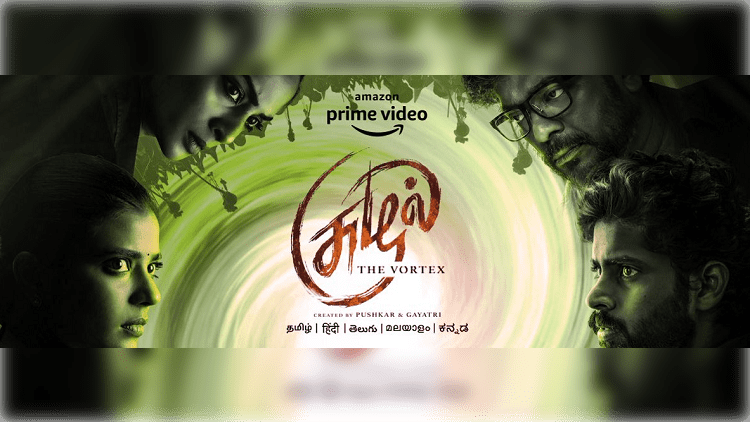Read in : தமிழ்
The Suzhal web series, directed by Bramma-Anucharan, sets out to spin a story about sexual harassment of children.
The in-thing today is that we take for granted the character of the people we’re moving with. In fact, our understanding of others is purely based on what they look like. That is to say, our assessment mainly revolves around how the others project themselves. When the characters that we have evaluated from our own POV turn upside down and the real faces or truths get thoroughly exposed in a vortex of circumstances, what happens? That is what the web series ‘Suzhal’ (Vortex) is about.
The eight-episode web series written by Pushkar-Gayathri is streaming on Amazon Prime Video.
The storyline goes like this: Back in the 1990s, a cement factory was set up in Sambalur, a small town. During its construction, a teenage girl, Ammani, goes missing. On the first day of poojas marking what is culturally branded as ‘mayanakollai festival’ (looting at graveyard) at the Angallaman temple, the ‘missing girl’ story goes viral among the people who seem to be mystified by the whodunit.
A quarter century down the line, 15-year-old girl Nila (Gopika Ramesh) is missing at the inaugural of the graveyard-related temple festival. She is the daughter of Shanmugam, cement factory union leader (R. Parthiban).
When the characters that we have evaluated from our own POV turn upside down and the real faces or truths get thoroughly exposed in a vortex of circumstances, what will happen? That is what the web series ‘Suzhal’ (Vortex) is about
In the morning that day, police had lathi-charged workers during a protest at the cement factory, following a fire in the factory at night. Then, the police launch an investigation to find out whether the fire was caused by some short circuit or is part of a conspiracy. The managing director Trilok Wadi (Harish Uthaman) accuses Shanmugam of indulging in the incendiary act.
At the same time, Chakkarai aka Chakravarthy, Sub-Inspector of Police, is on the trail of the probable kidnappers of Nila. He thinks he has a clue to the mystery when he comes to know that Nila had been stalked by Athisayam, son of Inspector of Police Regina (Shreya Reddy). As the SI tries to call up Athisayam, who is reportedly away in Moonaru with his friends, he finds the mobile phone at the other end switched off.
A series of riddles
What happened to Nila? Where exactly were Athisayam and friends? Who was really responsible for the factory fire? Did the Angallamman temple festival continue? All these questions are triggered in the minds of the audience like riddles. While unravelling the knots, the story meanders through several twists and turns.

Oodles of thrills flow across the story as visualisation, music, and actors’ emotional expressions are in sync with the inherently suspenseful knots that look like tough nuts to crack. As the title ‘Suzhal’ suggests, it is a vortex, cascading up and down.
Also Read:
So why do Tamil film-makers stay away from web series on OTT?
New Tamil film directors are many, but who will stay on to stand out?
The story unfolds in a small town with a few thousand people, their lifestyle serving as a backdrop. Yet, on the screen, just a dozen characters are projected. There is no paucity of thrills. A discerning film-watcher, accustomed to years of watching whodunits, can, however, join the dots and zero in on the real culprits.
Kathir excels
Coming to casting, it is the SI character played by Kathir who steals the show, hopping among a magical realm of humour, tantrums, sadness and perseverance. Yet more poignantly, he comes across subtly bringing out feelings of love.
As the female part of the lead pair, Nivedita Satheesh has no great task. In the romantic scene where she feels love for her would-be husband on whose face she sees some other woman, she scores a brownie point.
Parthiban as the labour union leader maintains poise typical of an old man and comes out neat. The character of his wife, Indumathi, is the spitting image of a typical woman devotee of some ashram which dishes out instant solutions on a platter to all problems under the sun.
Kumaravel, who plays the role of Parthiban’s brother, and his wife Latha Rao take us by surprise. The characters of Inspector Regina and Vadivelu played by Shreya and Premkumar are well crafted.
The web series is teeming with actors – Harish Uthaman (factory MD), Prasanna Ramachandran (constable), Santhana Bharathi (insurance agent), Gopika (Nila), Federick John (Adhisayam), Malar Thenappan (Soundharya) and ‘Pariyerum Perumal’ Venkatesan.
A more well-known face, Aishwarya Rajesh, who plays the character of Nandhini, was introduced in the series with much fanfare, but appears hamstrung by imperfection inherent in the characterisation.
Cinematographer Mukeshkumar, who dexterously brings all characters into the glittering frames, is a new surprise. The way he has depicted the temple festival scene through his camera receives deserved bouquets.
Similarly, the music scored by Sam C.S. whose musical translation of the scenes has the viewer’s brain vibrating with poignant vibes. He can be hailed as the pillar of ‘Suzhal.’
Editor Richard Kevin seems to fumble and falter now and then. He should have allowed more space for characters’ emotions and for either silence or BGM.
Bramma, who has directed the first five episodes, has a good shot at weaving mystery into the esoteric and obscurantist scenarios of temple festivals. Anucharan, who has helmed the second half of the web series, has ably infused an awe-inspiring subtlety into the emotional frames.
A more well-known face, Aishwarya Rajesh, who plays the character of Nandhini, was introduced in the series with much fanfare, but she was hamstrung by imperfection inherent in the characterisation itself
The strengths and weaknesses of the overall narrative depend on the dynamic duo of Pushkar and Gayathri, who have written and produced the series. However, they have lent sting to the first two episodes by projecting the boisterousness and come-what-may attitude of the youth as the spring of all crimes.
The detailed delineation of rituals and ceremonies as part and parcel of the Angalamman temple festival is baffling. However, it is unfortunate that the elaborate description detracts from the vitality of the main narrative. If the concept that only the great people, who are no more, are customarily celebrated and worshipped as gods of the hoi polloi, was elaborately dwelt upon, it would have easily connected with the crux of the narrative. On the contrary, it is sad that the storytellers seem to have just left dots for the audience to join. This act of omission, in a domino effect, looks like it puts paid to the spirit and tenor of the last two episodes.
Later episodes falter
In the fourth episode, love scenes of Athisayam and Nila move at a snail’s pace followed by the ‘chaotic’ scene of Parthiban’s family members having a row with Shreya in her house. That certain important questions are left unanswered has the web series ‘Suzhal’ faltering and fumbling.

Though it may sound like a spoiler, it has to be recorded here: The main focus of the storyline is sexual molestation of children. But the narratives go off at a tangent. And go down like ninepins.
The sexual molesters are shown as avoiding the natural, legal and healthy man-woman relationship; it may be one of the symptoms of psychological disorders. But ‘Suzhal’ leaves scope for a wrong conception that even childless people can be pigeonholed as the psychologically affected.
The web series could be misunderstood as blowing out of proportion the societal practice of looking askance at the unmarried and the childless.
Though children normally move with all people cordially, the aloof and lonely kids have probably suffered at the hands of molesters. ‘Suzhal’ seems to implant and justify an idea that teenage love is just an escapist route for those sexually molested.
Moreover, the story does not clearly give the reason why the children sexually harassed do not share with their families. To top it all, the information concerning teenage girl Ammani’s murder hangs in the balance.
The ironical contrast, shown in the series, between the obscurantist celebration of rural woman goddesses and the real-time harassment of women, does not fit in well with the narrative. The Hindi film ‘Stree’, released a couple of years ago, is an example of how it could have been differently told.
‘Suzhal’ may go down well with viewers who take the Angalamman temple festival as the archetypal mythological war between the Devas and the Asuras. But it is a moot point if the web series will appeal to those who want much more than the beaten track.
Read in : தமிழ்











